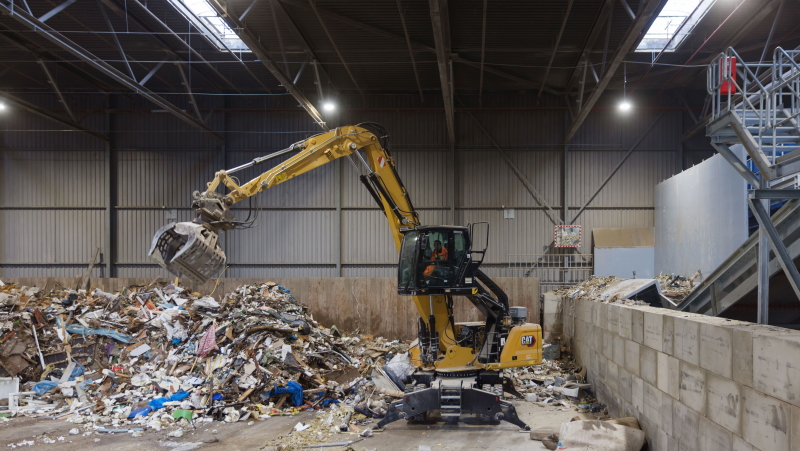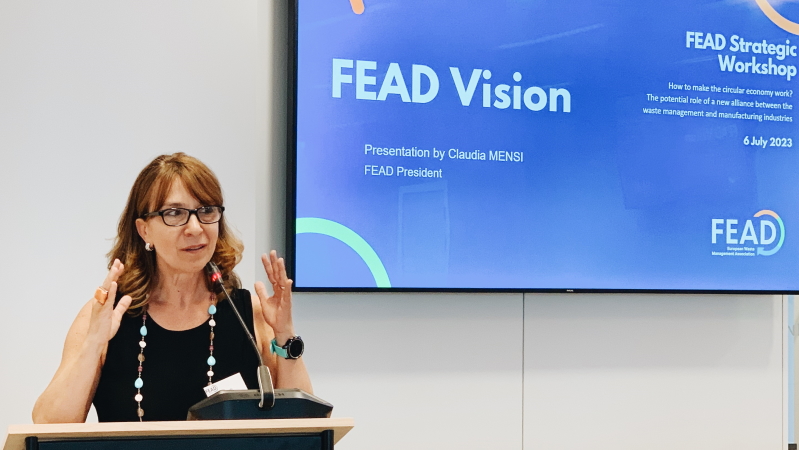
News
12 July 2023
FEAD sets the bar high: 75% recycling by 2035
European private waste sector presents new vision
The European waste federation is aiming to recycle three-quarters of all European waste. ‘We need a sea change in performance,’ says Claudia Mensi, president of the European Federation of Waste Management and Environmental Services (FEAD). The waste sector wants to enter into circular partnerships with industry to release more material streams for industrial production.
The European federation for the private waste sector unveiled its ambitious proposal on Thursday 6 July during a workshop on the circular economy. The workshop was about building new alliances between the waste sector and the processing and manufacturing industries. ‘Only about 12% of the raw materials currently used in Europe are circular,’ says Mensi, citing a recent Eurostat report. The EU’s statistical office reports that at the moment about 40% of the waste produced by the 27 EU member states is recycled and about the same volume is landfilled. In comparison, about 80% of the 60 million tonnes of waste produced in the Netherlands is recycled.

At the moment about 40% of the waste produced by the 27 EU member states is recycled
A self-sufficient Europe
The FEAD president says it is crucial that waste streams currently being landfilled or recycled for low-grade uses are redirected to release more materials for use by industry. As geopolitical developments are leading to a scarcity of raw materials, a self-sufficient Europe will depend heavily on high-quality recycling of material streams for its raw materials. ‘Much has already been set in motion for several waste streams, such as batteries and packaging. We see it as our duty to launch and expand similar initiatives for other waste streams in circular partnerships with industry. For example, construction and demolition wastes contain huge volumes of building materials that can be recovered for use in material loops.’
‘The potential for recovering raw materials for use in the European economy is huge.’
Huge raw materials potential
According to Mensi, exports of textiles have tripled in ten years, which represents a massive loss of materials. It is high time that European recycling capacity was brought up to the required level. The same goes for the ten million tonnes of materials in discarded furniture each year. ‘The potential for recovering raw materials for use in the European economy is huge. E-waste is a valuable source of rare earth elements and other materials, but only half of all electrical appliances are collected and recycled.’
Improving product design
FEAD wants to work with industry on setting standards and specifications for secondary materials to ensure they meet the quality required by manufacturers. Manufacturing industries are looking to increase the use of recycled materials in a large number of products, partly in response to European legislation. This can act as a catalyst, argues Mensi. ‘We must also improve the design of products to make them more recyclable and ensure they contain no hazardous chemicals.’

‘Only about 12% of the raw materials currently used in Europe are circular.’
Contact point for industry
Of course, this is an enormous challenge, acknowledges Mensi. ‘There is no one size fits all. Each industrial sector has its own standards and requirements, and we have to take that into account when setting up partnerships. FEAD wants to be the single contact point for industry.’
Assistance from governments
Mensi is asking national and local governments for their cooperation. ‘Without them we cannot achieve our goal. We are setting the bar high, but many EU member states do not have the basic infrastructure to support separate collection systems. Our sector has the expertise and technologies in house to provide assistance, so that these countries can get the best value possible out of their waste in the most environmentally friendly way.’
Rapid implementation of EU waste legislation
FEAD urges policymakers in the EU member states to make haste with implementing the EU waste legislation. In a recent report the European Commission notes that nine of the 27 member states, including the Netherlands, are at course to meet the 2025 recycling targets for municipal waste and packaging waste and the target of reducing landfilling of municipal waste to a maximum of 10% by 2035. Claudia Mensi: ‘Many countries are a long way off these targets. We in the private waste sector must clearly convey how important it is for the circular economy that member states meet these targets.’
Waste sector invests millions
The waste sector is fully prepared to make the necessary investments, says Mensi. ‘We know from surveys of our members that each year our sector invests five billion euros in sustainable state-of-the-art waste treatment, and we want to guarantee that level of investment for the next twelve years. This means we will be investing 60 billion euros in innovation and expansion of recycling capacity in Europe. Likewise, we call upon the EU to contribute through its research and development programmes such as LIFE and Horizon Europe. To take this forward we need to mobilise all available resources.’
